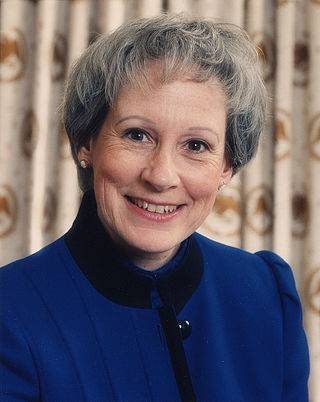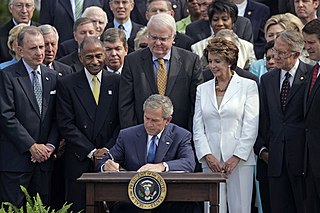
James Strom Thurmond Sr. was an American politician who represented South Carolina in the United States Senate from 1954 to 2003. Before his 48 years as a senator, he served as the 103rd governor of South Carolina from 1947 to 1951. Thurmond was a member of the Democratic Party until 1964, when he joined the Republican Party. He had earlier run for president in 1948 as the Dixiecrat candidate in opposition to Democrat Harry Truman, receiving over a million votes and winning four states, and endorsed Republican Dwight Eisenhower for president in the 1950s.
In United States government, the line-item veto, or partial veto, is the power of an executive authority to nullify or cancel specific provisions of a bill, usually a budget appropriations bill, without vetoing the entire legislative package. The line-item vetoes are usually subject to the possibility of legislative override as are traditional vetoes.

The Civil Rights Act of 1964 is a landmark civil rights and labor law in the United States that outlaws discrimination based on race, color, religion, sex, and national origin. It prohibits unequal application of voter registration requirements, racial segregation in schools and public accommodations, and employment discrimination. The act "remains one of the most significant legislative achievements in American history".

Rudolph Ely “Rudy” Boschwitz is an American politician and businessman from Minnesota. A member of the Republican Party, he served as a member of the United States Senate from 1978 to 1991.

David Ferdinand Durenberger was an American politician and attorney. Durenberger represented Minnesota in the United States Senate as a Republican from 1978 to 1995. He left the Republican Party in 2005 and became a critic of it, endorsing Democratic presidential nominees Hillary Clinton and Joe Biden in 2016 and 2020, respectively.

Olympia Jean Snowe is an American businesswoman and politician who was a United States Senator from Maine from 1995 to 2013. Snowe, a member of the Republican Party, became known for her ability to influence the outcome of close votes, including whether to end filibusters. In 2006, she was named one of America's Best Senators by Time magazine. Throughout her Senate career, she was considered one of the most moderate members of the chamber.

Nancy Josephine Kassebaum Baker is an American politician from Kansas who served as a member of the United States Senate from 1978 to 1997. She is the daughter of Alf Landon, who was Governor of Kansas from 1933 to 1937 and the 1936 Republican nominee for president, and the widow of former U.S. senator and diplomat Howard Baker.

John Goodwin Tower was an American politician and military veteran who represented Texas in the United States Senate from 1961 to 1985. He was the first Republican elected to the U.S. Senate from Texas since Reconstruction. Tower is known for leading the Tower Commission, which investigated the Iran-Contra Affair in the Reagan administration.

Alton Asa Lennon was an American Democratic politician who represented North Carolina in the U.S. House of Representatives and Senate. He first served as an interim appointment to the Senate from 1953 to 1954, unsuccessfully sought re-election, and later represented the Cape Fear region in the House from 1957 to 1973. Lennon is one of very few former senators in modern times to serve in the House after leaving the Senate.

The Children's Health Insurance Program (CHIP) – formerly known as the State Children's Health Insurance Program (SCHIP) – is a program administered by the United States Department of Health and Human Services that provides matching funds to states for health insurance to families with children. The program was designed to cover uninsured children in families with incomes that are modest but too high to qualify for Medicaid. The program was passed into law as part of the Balanced Budget Act of 1997, and the statutory authority for CHIP is under title XXI of the Social Security Act.

The domestic policy of the George W. Bush administration was the domestic policy of the United States from 2001 to 2009 while George W. Bush was president. Bush's main domestic policy advisors include Chairman of the Council of Economic Affairs Edward Lazear, Rob Portman, director of the Office of Management and Budget; U.S. Secretary of Labor Elaine Chao, Vice President Dick Cheney; U.S. Secretary of the Treasury Henry Paulson; U.S. Secretary of Commerce Carlos Gutierrez; U.S. Secretary of Health and Human Services Michael O. Leavitt and Allan Hubbard, director of the National Economic Council.

The Civil Rights Restoration Act of 1987, or Grove City Bill, is a United States legislative act that specifies that entities receiving federal funds must comply with civil rights legislation in all of their operations, not just in the program or activity that received the funding. The Act overturned the precedent set by the Supreme Court decision in Grove City College v. Bell, 465 U.S. 555 (1984), which held that only the particular program in an educational institution receiving federal financial assistance was required to comply with the anti-discrimination provisions of Title IX of the Education Amendments of 1972, not the institution as a whole.

The Comprehensive Anti-Apartheid Act of 1986 was a law enacted by the United States Congress. The law imposed sanctions against South Africa and stated five preconditions for lifting the sanctions that would essentially end the system of apartheid, which the latter was under at the time. Most of the sanctions were repealed in July 1991, after South Africa took steps towards meeting the preconditions of the act, with the final vestiges of the act being repealed in November 1993.

The Matthew Shepard and James Byrd Jr. Hate Crimes Prevention Act is a landmark United States federal law, passed on October 22, 2009, and signed into law by President Barack Obama on October 28, 2009, as a rider to the National Defense Authorization Act for 2010. Conceived as a response to the murders of Matthew Shepard and James Byrd Jr., both in 1998, the measure expands the 1969 United States federal hate-crime law to include crimes motivated by a victim's actual or perceived gender, sexual orientation, gender identity, or disability.

George H. W. Bush's tenure as the 41st president of the United States began with his inauguration on January 20, 1989, and ended on January 20, 1993. Bush, a Republican from Texas and the incumbent vice president for two terms under President Ronald Reagan, took office following his landslide victory over Democratic nominee Michael Dukakis in the 1988 presidential election. His presidency ended following his defeat in the 1992 presidential election to Democrat Bill Clinton, after one term in office. Bush was the father of the 43rd president, George W. Bush.

The Fair Labor Standards Act of 1938 29 U.S.C. § 203 (FLSA) is a United States labor law that creates the right to a minimum wage, and "time-and-a-half" overtime pay when people work over forty hours a week. It also prohibits employment of minors in "oppressive child labor". It applies to employees engaged in interstate commerce or employed by an enterprise engaged in commerce or in the production of goods for commerce, unless the employer can claim an exemption from coverage. The Act was enacted by the 75th Congress and signed into law by President Franklin D. Roosevelt in 1938.

The U.S. Congress enacted major amendments to the Voting Rights Act of 1965 in 1970, 1975, 1982, 1992, and 2006. Each of these amendments coincided with an impending expiration of some of the Act's special provisions, which originally were set to expire by 1970. However, in recognition of the voting discrimination that continued despite the Act, Congress repeatedly amended the Act to reauthorize the special provisions.
The Emmett Till Unsolved Civil Rights Crime Act is an Act of the United States Congress introduced by John Lewis (GA-5) that allows the reopening of cold cases of suspected violent crimes committed against African Americans before 1970. The U.S. House of Representatives passed the legislation on June 20, 2007, by a vote of 422 to 2. The U.S. Senate passed the legislation on September 24, 2008, by unanimous consent, and President George W. Bush signed the bill into law on October 7.

The George Floyd Justice in Policing Act of 2021 was a policing reform bill drafted by Democrats in the United States Congress. The legislation was introduced in the United States House of Representatives on February 24, 2021. The legislation aims to combat police misconduct, excessive force, and racial bias in policing.
Althea T. L. Simmons was a civil rights activist and attorney with the NAACP for over 35 years. Simmons was the head of the NAACP's Washington D.C. office and its chief lobbyist from 1979 to 1990. She was well-known for her effective lobbying, close monitoring of lawmakers' voting habits, and her commanding presence.












